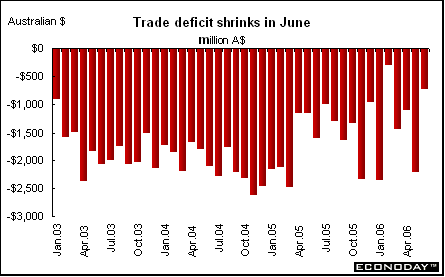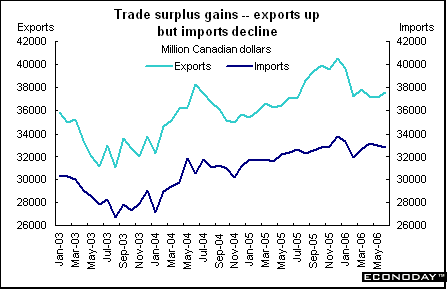Markets dislike uncertainty and investors had a good dose of it last week. But investors acquitted themselves well while several analysts explained that the risk of an aborted terrorist attack was already built into the market and did not add additional risk. The Federal Reserve's decision to pause and leave its policy rate at 5.25 percent was virtually a non-event, despite the hand-wringing that preceded the meeting. But looking forward to the next meeting presents a new set of uncertainties. For example, today's retail sales and import price data set off another wave of inflation concerns about future rate increases. This creates new uncertainties that can lead to volatile markets. Any news on Thursday was trumped by the aborted terrorist attack on flights leaving London for the U.S., and where unlike European equities, managed to rise. While no one expected the Bank of Japan to increase interest rates so soon again, market participants were on alert, just in case. The graph below shows the relative interest rate position of the major central banks. The Bank of Canada is the only one not to have had a meeting in the last couple of weeks.

Second quarter growth data picked up from a trickle to a flow. France and Italy announced their flash estimates while Japan released its preliminary estimate. France's GDP surprised on the high side, Japan's on the low. Many countries released June merchandise trade data during the past week as well. The deficit in Australia shrank notably while the Canadian surplus grew. France, Italy and the U.S. all saw their deficits get larger.
On the week, equities were mixed while the dollar gained ground against the euro, yen and pound sterling.
Global Stock Market Recap

Europe and the UK
Stocks in Europe and the UK were down last week. Downward pressure on the FTSE began when a major component of the index, BP, said it would have to close its Alaskan crude oil pipeline due to corrosion and cut off a major supply of U.S. crude. Earnings weighed as well, especially telecommunications stocks in Europe.

Investors were still digesting last week's interest rate increases by the Bank of England and the European Central Bank while awaiting the outcome of the Federal Reserve Open Market Committee meeting. Overseas markets are generally closed by the time the Fed makes its announcement so one has to look at Wednesday's results for reaction. At week's end, U.S. investors managed to divert attention from the terror threat to earnings and then to overly strong economic data while equities in Europe managed to get their bearings.
But one has to factor in special considerations when looking at August market behavior. August is high vacation season in Europe and the UK and markets are generally thin and listless. Reactions to news and economic events can sometimes spark more volatility than would otherwise occur. For example, the indexes lost ground Friday when U.S. data stirred inflationary fears. All three indexes - the FTSE, CAC and DAX were down on the week.
Bank of England's quarterly Inflation Report
The Bank of England issued its quarterly Inflation Report on Wednesday. The Bank's forecast shows that if the key interest rate remained at 4.75 percent, inflation would be higher than its 2 percent target rate for the next two years. The betting now is that the Bank will increase rates one more time in 2006 to 5 percent absent an economic surprise. BoE governor Mervyn King said there is a 50-50 chance that the CPI will exceed 3 percent. That is the level at which the Bank would have to write a public letter to the Chancellor of the Exchequer explaining the deviation from target. This has never happened as yet.
Asia/Pacific
Mid-week gains for the Nikkei helped offset declines at the beginning and end of the week. Stocks were down on Monday in response to the weak U.S. employment situation report that had been released on the previous Friday. And on Friday, investors responded to the weaker-than-anticipated GDP report along with the heightened terrorist activity, which especially exerted downward pressure on airline stocks. Despite the pressures, only the Kospi and the STI were down slightly on the week. The Kospi, Nikkei and Topix remain below their end of 2005 levels.

Currencies
Both the yen and euro lost ground against the U.S. dollar in trading last week. Friday's boost to the dollar found its roots in a better-than-expected retail sales report. The data bolstered those who think the Fed will increase interest rates again after pausing last week. At the same time, the yen was pressured downward by the weaker-than-expected second quarter GDP report. The yen dropped Friday after the Bank of Japan's governor Toshihiko Fukui said there is no predetermined timeframe for further interest rate increases. At their meeting, the BoJ voted to keep rates unchanged at 0.25 percent. At his press conference after the meeting, Fukui said the central bank has not ruled out another increase this year, but he stressed there's no decision yet on when an increase might be *made. The euro had rallied to about $1.29 after the Fed paused, but the currency then reversed course and dropped. The pound sterling also lost ground against the dollar after heightened terror alerts worried speculators.

The dollar firmed as funds from the Asia-Pacific region poured into dollar assets on fears that the recent terror threats would hurt the tourism and export-dependent Asian economies. In times of global uncertainty 'safe' assets such as U.S. Treasuries become more attractive, and emerging markets less so.
Indicator scoreboard
Germany - June industrial production was down 0.4 percent after jumping 1.5 percent in May. When compared with last year, industrial production was up 4.4 percent.

France - June seasonally adjusted industrial output was unchanged on the month and up 2.8 percent when compared with last year. Manufacturing output was down 0.5 percent but up 3.3 percent on the year. Auto output sank 4 percent in June after jumping 5.6 percent in May. Consumer goods were also down along with semi-finished goods. However, capital goods output was up on the month.

June merchandise trade deficit surged to €2.6 billion from €1.7 billion in May. Exports were down 0.7 percent, partially offsetting the 1.7 percent increase in the prior month. However, imports were up 2 percent after increasing 0.9 percent in May. Imports were boosted by the purchase of two Boeing planes and a satellite.

Second quarter flash gross domestic product was up 1.1 percent to 1.2 percent when compared with the previous quarter and 2.2 percent when compared with the same quarter a year ago. As with all flash estimates, no detail was available but will be released on August 22nd.

Italy - Second quarter gross domestic product was up 0.5 percent and 1.5 percent when compared with the same quarter a year ago. As with all flash estimates no detail was available (released Sept. 8).

Britain - June industrial production edged down 0.1 percent and was down 0.7 percent. Industrial production was dragged lower by a 2.9 percent decline in mining and quarrying and a 3.1 percent drop in oil and gas extraction, caused by maintenance shutdowns on oil rigs and on the gas inter-connector between the U.K. and mainland Europe. Manufacturing output was up 0.1 percent and 0.9 percent on the year. Output was up in eight of 13 sectors.

June world merchandise trade deficit on goods improved to £6.5 billion from £7 billion in May. Imports were down 2.7 percent while exports were down 1.2 percent. On combined goods and services, the deficit was £4.0 billion, lower than the level of £4.7 billion in May. The service surplus was £2.5 billion, slightly higher than in May. Excluding oil and erratic items, exports fell by 3.5 percent while imports were down 2 percent.

Asia
Japan - June corporate goods price index jumped by 0.7 percent and was up 3.4 percent when compared with last year. Prices of petroleum and coal products rose 17.6 percent in July from a year earlier while prices of nonferrous metal jumped 57 percent on the year, mainly driven by costlier copper.

Second quarter gross domestic product was up 0.2 percent and 2.1 percent when compared with the same quarter a year ago. On an annualized basis, GDP was up 0.8 percent. Consumer spending accelerated 0.5 percent, from a revised 0.2 percent in the first quarter. Business investment expanded 3.8 percent, up from a revised 3.3 percent in the first quarter.

Australia - July employment jumped by 50,700 jobs and the unemployment rate ebbed down to 4.8 percent. Full time employment was up 27,100 while part time jobs were up by 23,600. The participation rate was 65 percent, up from 64.8 percent in June.

June seasonally adjusted merchandise trade deficit was A$722 million, a considerable improvement from May's A$1.5 billion deficit. Exports were up 7.7 percent while imports were down 1.2 percent. Farm exports such as meat, sugar, wheat and wool gained 1 percent. Shipments of non-rural goods, which include minerals, jumped 11 percent. Services exports dropped 1 percent. Imports of capital goods, which include business machinery and vehicles, slipped 1 percent. Imports of intermediate goods, which include fuel, dropped 3 percent. Imports of consumer goods gained 1 percent.

Americas
Canada - June merchandise trade surplus widened to C$4.75 billion from C$4.11 billion in May. Exports rose 1.1 percent as energy shipments increased 3.4 percent while sales of industrial goods such as copper and aluminum rose 2.9 percent. Imports fell 0.7 percent led by a 5.5 percent drop in chemicals and plastics. Canada's trade surplus with the U.S. narrowed to C$8.25 billion during the month from May's C$8.38 billion.

Bottom line
Though the week's run of indicators was on the light side, there were numerous important ones. They included second-quarter GDP flash reports for France and Italy and a preliminary GDP report for Japan. Japan grew significantly less than expected while France pleased analysts. However, this pleasure did not translate to meaningful stock market gains as the investors struggled to recover from the higher risk factor set off by the alarming terrorist news on Thursday.
Next week sees the ongoing release of flash GDP reports in Europe with both Germany and the EMU releasing their first estimates on Monday. It is a big week in the UK as labor market, price data and retail sales data are released. And the Bank of England will be releasing the transcript of its minutes from the August 3rd meeting. Analysts will be sure to scour these minutes for clues to future policies.

